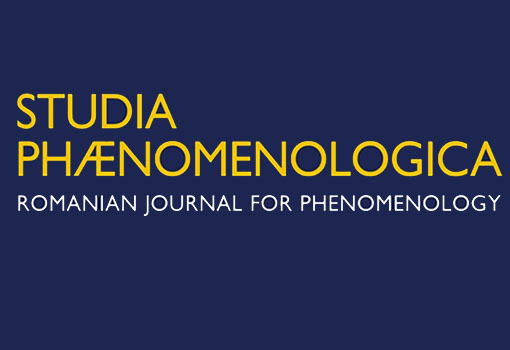Call for Papers: Studia Phaenomenologica Vol. XVI (2016): Film and Phenomenology
15-07-2015 22:49
Call for Papers: Studia Phaenomenologica Vol. XVI (2016): Film and Phenomenology
Guest Editors: Christian Ferencz-Flatz and Julian Hanich
EXTENDED DEADLINE: 1 September, 2015.
The 2016 issue of Studia Phaenomenologica will interrogate the relationship of phenomenology and film.
When it comes to associating film and philosophy, no other analogy is as persistent as the equation of film and phenomenology (except perhaps the cliché of comparing film audiences to the people in Plato’s cave). The film-phenomenology analogy is already foreshadowed by Husserl’s letter to Hugo von Hofmannsthal from 1907, in which he compares the phenomenological method to aesthetic experience. It is explicitly sketched out in Merleau-Ponty’s lecture “The Film and the New Psychology” from 1945 and it is then picked up by numerous authors like Bazin, Ayfre and others. According to this analogy, Acoafilm and phenomenology both share a similar view of perception as a temporal process, they both regard man as a being situated in the world, they both operate the same reduction of positional belief and they both hold the same affinity towards intuitive description.
Apart from that, film has from the onset attracted the attention of phenomenologists – not only as an inevitable addendum to traditional aesthetics (Ingarden, Dufrenne), but first of all as a specific problem for a philosophy of perception. Husserl himself mentions the topic in several of his manuscript notations from the 1920s, where he considers film as a special case of “image consciousness”, a fundamental modification of perception. Similarly, in contemporary image theory the phenomenological approach to images in general is most often associated with a theory of perception. But the experience of film obviously implies more than just a question of image perception. When Benjamin claims film to determine the discovery of “a new region of consciousness” or when Deleuze coins the idea of a “film consciousness”, they both think of film – without actually looking at film phenomenologically – in terms that make it appear central for phenomenology itself. For film does indeed constitute an experiential regime wherein our bodily, temporal, spatial, emotional, intersubjective, worldly and situational experiences suffer a technically and historically conditioned modification that phenomenology can and should not ignore and to which this special issue of Studia Phaenomenologica is therefore dedicated.
In film studies phenomenological examinations have a deep grounding, ranging from the work of Jean Mitry and Amédée Ayfre to the writings of Jean-Pierre Meunier and the early Christian Metz. But after this flourishing in the 1960s, interest in film phenomenology disappeared for a long time and one was forced to speak of a “neglected tradition of phenomenology in film theory” (Dudley Andrew). Following the publication of Vivian Sobchack’s groundbreaking book The Address of the Eye. A Phenomenology of Film Experience (1992), the picture has changed. Phenomenology has again become a vital field in film studies. The important work of Allan Casebier, Laura Marks, Jennifer Barker, Jane Stadler, Malin Wahlberg, Daniel Frampton (to name but a few), underlines the growing interest in a phenomenological approach to the medium of film.
However, film phenomenology has still a number of blind spots that we would like to start filling in this special issue. For instance, phenomenological work has so far mostly focused on the film experience, thereby neglecting the concrete reception surroundings of the viewer’s encounter with the filmic object. Since the interrelation of viewer and film is often not confined to an individual engagement and never takes place in a spatial vacuum, phenomenological descriptions should take into account the other recipients as well as the specific viewing conditions. How we experience a film depends on where we experience it, withwhom as co-viewer and presented by what medium. Moreover, film phenomenologists have rarely devoted close attention to film style. Thus the way specific filmic strategies relate to specific film experiences remains an open question. Since phenomenology focuses on experience, it is naturally more inclined toward the aesthetic recipient than the aesthetic object. But if we take into account that filmmakers deliberately aim to produce certain experiences, how can we best describe the experience of the filmmakers’ various stylistic and formal strategies? These are only a few of the questions film phenomenology should take into account.
We therefore seek contributions to our special issue. Submitted articles may focus on but are certainly not limited to the following topics:
Theoretical Questions
- the significance of phenomenology for film studies: what advantages does the phenomenological method have over other approaches like cognitivism, Deleuzian theory, neurocinematics? And where are the limitations of phenomenology?
- expanding film phenomenology: what are roads not taken so far and should be followed in the future, thereby enriching the scope of film phenomenological inquiries?
- the significance of film for phenomenology: what is the exact philosophical significance of film for phenomenology? Is the case of film and film experience exemplary in any way for the traditional core topics of phenomenology?
Detailed Descriptions
- the experience of various types of cinema and other moving-image dispositifs (e.g., the IMAX, the drive-in theatre, the museum and gallery space, watching film on an airplane)
- the experience of various cinematic affects, emotions and moods (e.g., the kinesthetic empathy in comedies or sports films, feeling moved or elevated by a melodrama)
- the experience of collectivity in the cinema and other venues with a co-present audience
- the interplay of viewer activity and passivity in film experience
- questions related to audio-vision and synaesthesia in film experience
Historical Inquiries
- contributions concerning the tradition of phenomenology in film studies: how do we assess the work of Mitry, Meunier, Sobchack and others from today’s perspective?
- historical revaluations of the interest towards film in phenomenology: how to judge the position of Husserl, Ingarden, Merleau-Ponty and others toward film nowadays?
Submissions in English, French, and German will be accepted, and should comply with the following guidelines: http://www.studia-phaenomenologica.com/?page=submit
EXTENDED DEADLINE: 1 September, 2015.
The papers should be sent to: submissions@phenomenology.ro
VARIA
In each volume of Studia Phaenomenologica, there is a section of Varia. Therefore, articles that do not fit the topic of our calls for papers, can be submitted to the editors, following the formal rules indicated in our website, at the email address: submissions@phenomenology.ro.
Please send your book reviews at: book-review-editor@phenomenology.ro.
Επιστροφή


